小升初语法一般现在时态
小升初英语语法知识点大全
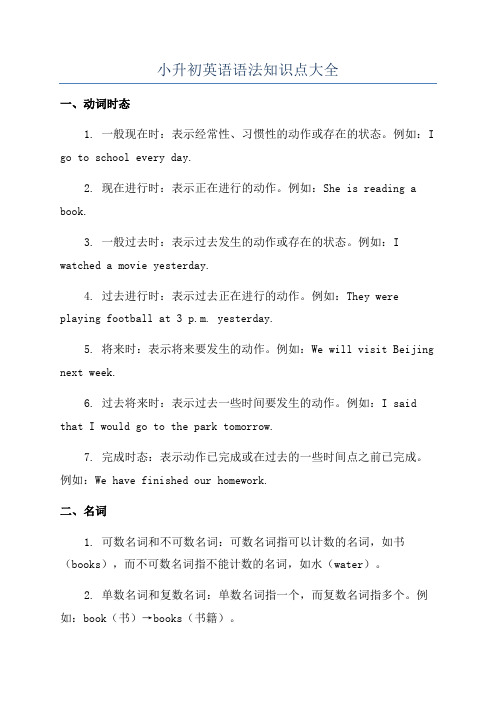
小升初英语语法知识点大全一、动词时态1. 一般现在时:表示经常性、习惯性的动作或存在的状态。
例如:I go to school every day.2. 现在进行时:表示正在进行的动作。
例如:She is reading a book.3. 一般过去时:表示过去发生的动作或存在的状态。
例如:I watched a movie yesterday.4. 过去进行时:表示过去正在进行的动作。
例如:They were playing football at 3 p.m. yesterday.5. 将来时:表示将来要发生的动作。
例如:We will visit Beijing next week.6. 过去将来时:表示过去一些时间要发生的动作。
例如:I said that I would go to the park tomorrow.7. 完成时态:表示动作已完成或在过去的一些时间点之前已完成。
例如:We have finished our homework.二、名词1. 可数名词和不可数名词:可数名词指可以计数的名词,如书(books),而不可数名词指不能计数的名词,如水(water)。
2. 单数名词和复数名词:单数名词指一个,而复数名词指多个。
例如:book(书)→books(书籍)。
3. 可数名词的复数形式:许多词在复数时需进行变位,如cat(猫)→cats(猫)、baby(婴儿)→babies(婴儿)。
4. 不可数名词的用法与数量表示:不可数名词无复数形式,不能与数词或a/an连用。
对于不可数名词表示的量,需使用量词或具体表示数量的词语,如a bottle of water、a cup of tea。
三、形容词和副词1. 形容词用法:形容词修饰名词,用来描述名词的性质或特征。
例如:a big dog(一只大狗)。
2. 形容词的比较级和最高级:形容词的比较级用于表示两个人或物之间的比较,如taller(更高),而最高级则用于表示三个或三个以上人或物之间的比较,如the tallest(最高的)。
【专项复习】小升初英语课件-专题 04 时态 第一讲 一般现在时 全国通用版
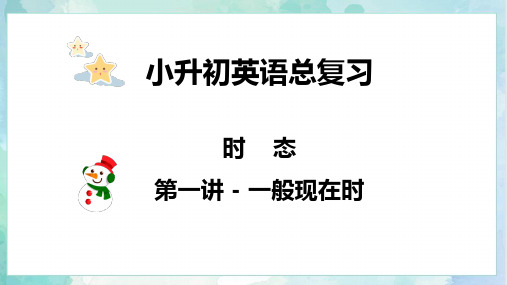
考点三 一般现在时用法
3.用在格言或警句中 e.g. Pride goes before a fall.骄者必败。 4.现在时刻的状态、能力、性格、个性 e.g. Xiao Wang writes good English but does not speak well. 小王的英语书面表达能力好,但口语不好。
teaches washes
goes
cries studies
考点六 解题方法
1. 填空、选择解题两步走
① 找时间标志词,判断时态【一般现在时】 ② 找主语,判断是否需要进行动词变化
考点六 解题方法
2. 句型转换解题技巧
① 含有be 动词以及情态动词的句型转化 肯定句:主语+am/is/are/情态动词+其他.
思路点拨:该题考查动词短语.根据sometimes判断该句为一般现在时,主 语Su Yang是第三人称单数,故谓语动词要变为单三形式.fly的第三人称 单数形式是flies,该句用复数形式kites.故选:B.
例题解析
【例5】 1. His father is a kind man. He often _______(help) others. 2. My brother ________ (play) computer every day. 3. Sometimes Tony __________(have) lunch at home.
考点四 一般现在时句型
1.肯定句: There+ be动词+其他.
There is an apple on the desk.
2.否定句: There + be动词+ not+其他. There isn't an apple on the desk.
小升初英语语法:一般现在时

16. She _g_o_e_s__ (go) to school from Monday to Friday.
“辅音字母+y”结尾 变y为i, 再加-es,
fly—flies
特殊情况
have→has do→does go→goes
4、实义动词的一般现在时的基本句型
1) 肯定句:
☺主语(I/We/You/They)+实义动词原形+其他 如:I stay at home on Saturdays. They have sports every day.
回顾一
一般现在时的含义
一般现在时表示经常性或习惯性的动作或存在 的状态等。它通常和表示时间状语连用。
例如: Tom goes to school at 7:30 in the morning.
基本用法
1. 表示现在的情况或状态,或者经常性、习 惯性的动作或状态
I wash the dishes every day. You sometimes take a bus home. They usually have lunch at 11:30. He always gets up early. She is often late for school.
I will visit him when I am free. 我有空就去拜访他。 We will have picnic if it doesn't rain tomorrow. 如果明天不下雨,我们就去野餐。 b.表示按规定,计划,时间要发生的动作。 The plane takes off at 11:00. 飞机11点起飞。 c.表示客观性很强的将来。 Today is Wednesday,so tomorrow is Thursday. 今天是星期三,所以明天是星期四。
小升初英语总复习语法 时态专项

如:I am not a student.我不是一名学生。 • (3)一般疑问句:Be动词+主语+其他?(be动词提到句首)
如:—Are you a student?你是一名学生吗?—Yes, I am./No, I’m not.是的,我是。/不,我不是。 • (4)特殊疑问句:特殊疑问词+一般疑问句?
How does your mother go to school?
四、动词第三人称单数的变化规则:
• (1)一般情况下,直接加-s。 如:cook-cooks, play-plays, like-likes。 • (2)以“s, x, sh, ch,o”结尾的单词,加-es。 如:wash-washes, go-goes, do-does, teach-teaches, watch-watches。 • (3)以“辅音字母+y”结尾的单词,变y为i,再加-es。 如:study-studies, fly-flies。
三.动词过去式的变化规则:
(1)一般在动词末词尾加-ed。 如:cook-cooked, play-played。 (2)以不发音的e结尾的单词加-d。 如:taste-tasted。 (3)以重度闭音节结尾,且词尾只有一个辅音字母,则双写这个辅音字母,再加-ed。 如:stop-stopped。 (4)以“辅音字母+y”结尾的单词,变y为i,再加-ed。 如:study-studied。 (5)不规则动词的过去式。如:do-did, go-went。
【即时演练】
一、单项选择。
( B )1.My brother
小升初英语讲解时态:一般现在

小升初英语总复习精讲精练之动词时态(1) 一般现在时【精讲】前段时间,我们梳理了小升初英语常考的词法,从今天开始,我们一起看看小升初英语常考的时态。
今天先来复习第一部分:一般现在时。
一般现在时,表示通畅性、规律性、习惯性的动作或状态。
那么在考试中怎样判断句子中应该用什么时态呢?首先我们一起看看一般现在时的关键词。
[关键词]always(总是), often(经常), usually(通常), sometimes(有时), never(从不), every day(每天)/ week(每周)/ month(每个月)/ year(每年), once/ twice/ three times a day / week / month / year(每天/每周/每月/每年一次/两次/三次......)。
如果句子中出现以上关键词,那么这个句子要用一般现在时。
那么一般现在时又有哪些人称之分呢?[人称]1、单三人称:he, she, it以及所有能够用he,she,it所代替的人称。
2、非单三人称:除单三人称以外其他的人称。
为什么在一般现在时中,我们要把人称分为以上两种呢?这也是小升初考试的一个考点,即:在一般现在时中,主语如果是单三人称,谓语动词要在词尾+s或es(动词单三人称的变化规则同名词单数变复数),主语如果是其他人称,谓语动词用原形。
[构成形式]一般现在时的构成形式分为两种:一种是含有be动词,另一种是含有实意动词。
我们一起通过下面两个表格看看这两种形式有什么区别:我们一起看看下面几个例句:1、I drink milk every day. 我每天都喝牛奶。
2、He likes playing tennis.他喜欢打网球。
3、I don’t speak French.我不讲法语。
4、Where is my skirt ?我的裙子在哪里?5、Does he get up early every morning? 他每天都起床很早吗?【精练】一、用括号内所给动词的适当形式填空。
小升初语法辨析一般现在时一般过去时一般将来时(讲义)人教PEP版英语六年级下册

小升初英语语法辨析:一般现在时、一般过去时、一般将来时&专项模拟练习一、一般现在时1.定义:表示经常发生的动作、存在的状态或普遍真理。
2.时间标志词:often(经常)、usually(通常)、always(总是)、sometimes(有时)、every day/week/month/year(每天/ 周/ 月/ 年)等。
3.结构:1.主语(非第三人称单数)+ 动词原形。
例如:You play basketball afterschool.(你放学后打篮球。
)2.主语(第三人称单数)+ 动词的第三人称单数形式。
例如:He playsbasketball after school.(他放学后打篮球。
)4.用法:1.表示经常性或习惯性的动作。
如:I go to school by bike every day.(我每天骑自行车去上学。
)2.表示现在的状态或特征。
如:She is tall and thin.(她又高又瘦。
)3.表示客观事实或普遍真理。
如:The earth moves around the sun.(地球绕着太阳转。
)二、一般过去时1.定义:表示过去某个时间发生的动作或存在的状态。
2.时间标志词:yesterday(昨天)、last week/month/year(上周/ 上个月/ 去年)、ago(……以前)、in + 过去的年份等。
3.结构:主语+ 动词的过去式。
例如:You played basketball yesterday.(你昨天打了篮球。
)4.用法:1.表示过去某个时间发生的动作。
如:I went to the park last Sunday.(我上周日去了公园。
)2.表示过去存在的状态。
如:He was happy yesterday.(他昨天很开心。
)三、一般将来时1.定义:表示将来某个时间要发生的动作或存在的状态。
2.时间标志词:tomorrow(明天)、next week/month/year(下周/ 下个月/ 明年)、in the future(在未来)等。
小升初英语语法专题精讲学案 一般现在时(难度简单)(含答案)
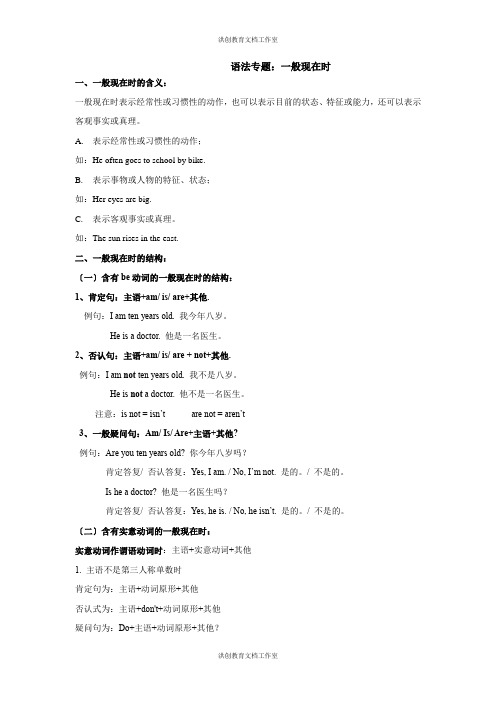
语法专题:一般现在时一、一般现在时的含义:一般现在时表示经常性或习惯性的动作,也可以表示目前的状态、特征或能力,还可以表示客观事实或真理。
A.表示经常性或习惯性的动作;如:He often goes to school by bike.B.表示事物或人物的特征、状态;如:Her eyes are big.C.表示客观事实或真理。
如:The sun rises in the east.二、一般现在时的结构:〔一〕含有be动词的一般现在时的结构:1、肯定句:主语+am/ is/ are+其他.例句:I am ten years old. 我今年八岁。
He is a doctor. 他是一名医生。
2、否认句:主语+am/ is/ are + not+其他.例句:I am not ten years old. 我不是八岁。
He is not a doctor. 他不是一名医生。
注意:is not = isn’t are not = aren’t3、一般疑问句:Am/ Is/ Are+主语+其他?例句:Are you ten years old? 你今年八岁吗?肯定答复/ 否认答复:Yes, I am. / No, I’m not. 是的。
/ 不是的。
Is he a doctor? 他是一名医生吗?肯定答复/ 否认答复:Yes, he is. / No, he isn’t. 是的。
/ 不是的。
〔二〕含有实意动词的一般现在时:实意动词作谓语动词时:主语+实意动词+其他1. 主语不是第三人称单数时肯定句为:主语+动词原形+其他否认式为:主语+don't+动词原形+其他疑问句为:Do+主语+动词原形+其他?肯定答复/否认答复:Yes, 主语+do. / No, 主语+ don’t.例句:I like Chinese.I don’t like Chinese.Do you like Chinese? Yes, I do. / No, I don’t.〔三〕含有情态动词的一般现在时的结构〔以情态动词can为例〕:1、肯定句:主语+can+动词原形+其他.例句:The monkeys can climb trees. 猴子会爬树。
小升初英语重点归纳语法知识(英语动词4种时态)
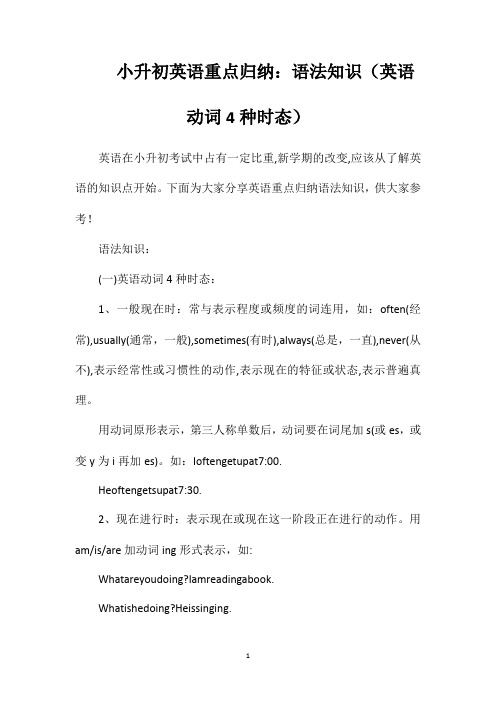
小升初英语重点归纳:语法知识(英语动词4种时态)英语在小升初考试中占有一定比重,新学期的改变,应该从了解英语的知识点开始。
下面为大家分享英语重点归纳语法知识,供大家参考!语法知识:(一)英语动词4种时态:1、一般现在时:常与表示程度或频度的词连用,如:often(经常),usually(通常,一般),sometimes(有时),always(总是,一直),never(从不),表示经常性或习惯性的动作,表示现在的特征或状态,表示普遍真理。
用动词原形表示,第三人称单数后,动词要在词尾加s(或es,或变y为i再加es)。
如:Ioftengetupat7:00.Heoftengetsupat7:30.2、现在进行时:表示现在或现在这一阶段正在进行的动作。
用am/is/are加动词ing形式表示,如:Whatareyoudoing?Iamreadingabook.Whatishedoing?Heissinging.3、一般将来时:常与表示将来的时间连用,如:tomorrow,nextweek,nextyear等,表示将要发生的动作或情况。
用am/is/are加goingto形式表示,如:Whatareyougoingtodotomorrow?I;;mgoingtorideahorse.用will加动词原形表示,如:WhatwillyoudonextSunday?Iwillgoshopping.用am/is/are加动词ing形式表示,如:Whatareyoudoingtomorrow?I;;mgoingbowling.4、一般过去时:经常与表示过去的时间连用,如:yesterday,lastnight 等,表示过去某时发生的动作或情况。
动词要用动词的过去式。
如:Whowasfirst?Kenwasfirst.Wherewereyouyesterday?Iwasathome.Whatdidyoudoyesterday?Iwenttoschool.以上是为大家分享的英语重点归纳语法知识,希望对大家有所帮助!2017精选小升初英语知识点讲解:名词备战小升初英语名词复数规则语法考点。
2024小升初英语必考语法知识点归纳

2024小升初英语必考语法知识点归纳2024字小升初英语考试是学生们升入初中的重要关卡之一,英语语法是考试重点和难点。
以下是2024小升初英语必考的语法知识点归纳,供同学们参考复习。
一、动词时态1.一般现在时:表示经常性的动作或客观事实。
例如:I go to school every day.2.现在进行时:表示现阶段正在进行的动作。
例如:She is studying English now.3.一般过去时:表示已经完成的过去的动作。
例如:I watched a movie last night.4.过去进行时:表示过去一些时间段正在进行的动作。
例如:They were playing chess this morning.5.将来时:表示将来要发生的动作或存在的状态。
例如:I will go on a trip next week.6.过去将来时:表示过去一些时间节点上将要发生的动作。
二、名词1.可数名词与不可数名词:可数名词有单数和复数之分,不可数名词只有单数形式。
例如:table(可数), water(不可数)2.名词所有格:表示所有关系时,在名词后加's。
例如:Tom's book(汤姆的书)3.复合名词:由两个或两个以上名词构成并有一定结构的名词。
例如:classroom, basketball三、形容词与副词1.形容词用来修饰名词,副词用来修饰动词、形容词或其他副词。
例如:She is a beautiful girl.(形容词修饰名词)He runs fast.(副词修饰动词)2. 形容词的比较级和最高级:一般在形容词后面加-er表示比较级,在形容词前面加the最高级。
例如:He is taller than me.(比较级)He is the tallest boy in our class.(最高级)四、代词1. 人称代词:主格形式有I, you, he, she, it, we, they;宾格形式有me, you, him, her, it, us, them。
小升初小学英语语法总复习现在进行时一般现在时

wash finish
washes finishes
catch
go do
catches
goes does
If the verb ends in -y, we have to change the letter y into ies.
tidy study
tidies studies
carries
carry
Do Does
I/you/we/they He/she/it
do?
e.g. Do you sing? e.g. Does Sam eat fish?
Now you try.
____ he sweep the floor? Does
Do you water the plants? ____
_____ you make the bed? Do
doesn’t like sweets. e.g. I like sweets. She ____________ 1 She runs fast. I ____________ don’t run fast.
Now you try
doesn’t play 2 Paul plays football but he ____________ basketball.
need to change the verb.
He waters the plants every day. She walks the dog every day. My mum cooks us dinner every day.
When we talk about a third person (he/she/it/名单),
现在进行时的含义与构成
小升初英语时态总结
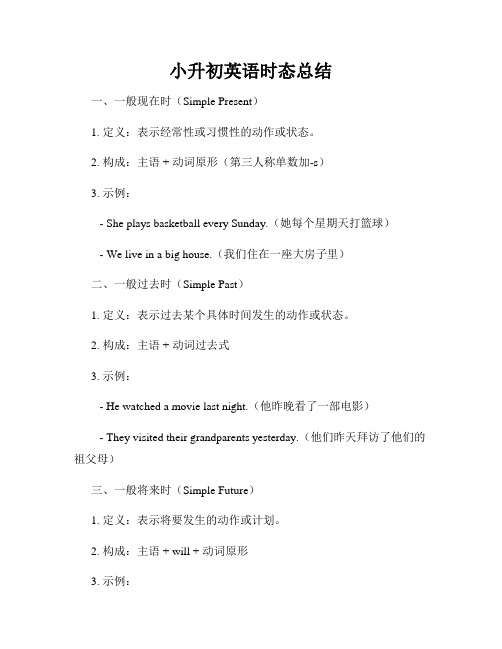
小升初英语时态总结一、一般现在时(Simple Present)1. 定义:表示经常性或习惯性的动作或状态。
2. 构成:主语 + 动词原形(第三人称单数加-s)3. 示例:- She plays basketball every Sunday.(她每个星期天打篮球)- We live in a big house.(我们住在一座大房子里)二、一般过去时(Simple Past)1. 定义:表示过去某个具体时间发生的动作或状态。
2. 构成:主语 + 动词过去式3. 示例:- He watched a movie last night.(他昨晚看了一部电影)- They visited their grandparents yesterday.(他们昨天拜访了他们的祖父母)三、一般将来时(Simple Future)1. 定义:表示将要发生的动作或计划。
2. 构成:主语 + will + 动词原形3. 示例:- I will go to the park tomorrow.(我明天会去公园)- She will study hard for the exam.(她会为考试努力学习)四、现在进行时(Present Continuous)1. 定义:表示现在时刻正在进行的动作。
2. 构成:主语 + am/is/are + 动词-ing形式3. 示例:- They are playing football in the park.(他们正在公园踢足球)- I am studying English now.(我正在学习英语)五、过去进行时(Past Continuous)1. 定义:表示过去某个时间段内正在进行的动作。
2. 构成:主语 + was/were + 动词-ing形式3. 示例:- He was watching TV when I called him.(我给他打电话时,他正在看电视)- We were having dinner at 7 pm last night.(昨晚7点我们正在吃晚餐)六、将来进行时(Future Continuous)1. 定义:表示将来某个时间点正在进行的动作。
小升初语法讲解一般现在时专题训练(讲义)牛津译林版英语六年级下册

小升初语法讲解一般现在时专题训练(讲义)牛津译林版英语六年级下册知识点讲解一般现在时:1. 一般现在时构成形式:sb. do/ does; sb. is/ am/ are2. 一般现在时用法:1). 表示经常的或习惯性的动作,常与表示频度的副词连用。
常用的频度副词有:always、often、usually、sometimes频度副词在句中通常放在行为动词之前,系动词、助动词之后。
如:He often goes to the cinema2). 表示现在的状态。
例:Mother is ill.3) 表示主语具备的性格、特征和能力等。
例:He sings well.4). 表示客观真理,客观存在,自然现象。
例:The earth turns around the sun.5). 表示按计划或安排好的,或将要发生的动作,可用一般现在时表将来。
但只限于start, begin, leave, go, e, arrive, return, take place等。
例:My train leaves at 7:00 this morning.6). 在复合句中,当主句是一般将来时,时间或条件状语从句的谓语动词只能用一般现在时来表示将来要发生的动作。
If it rains tomorrow, we won’t go there.3. 第三人称单数变化规律:1). 一般情况下,动词直接在结尾加s. Eg.: help helps, play plays2). 以s, x, ch, sh, o结尾的动词,在后面加es. Eg.: brush brushes, go goes, teach teaches3). 以辅音字母+y结尾的动词,把y变为i加es. Eg.: study studies, try tries4. 相关句型1). 一般疑问句:Is/ Are +主语…? Do/ Does +主语+动词原形…?2). 否定句:主语+am /is/ are +not… 主语+do/ does not +动词原形…精选精练一、选择题1.He often ______ to the zoo. ()A.go B.visits C.goes2.Helen ______ early every day. But she ______ late this morning. ()A.gets up; was B.get up; is C.got up; was 3.—Look! There ______ a lot of honey and drinks here. I like them. ()—Me, too.A.was B.is C.has4.Eric’s neck _______. He _______ sleep well at night. ()A.hurt; can’t B.hurts; can’t C.hurts; can5.John usually __________ to bed early. But he __________ to bed late yesterday. () A.go; went B.goes; went C.goes; go6.Sam brings some water quickly and __________ it __________ the hole. () A.pour; to B.pours; into C.pour; into7.—How ______ Tim feel now?()—He ______ hungry.A.do; feels B.does; feel C.does; feels8.Many years ago, Lily ________ to work. But now she usually ________ the metro to work. ()A.walked; takes B.walked; took C.walks; takes9.Lily ________ in New York last year. She ________ in Beijing now. () A.was; is B.were; are C.were; was10.I ______ a white sweater, but my friend Helen ______. ()A.have; don’t B.has; doesn’t C.have; doesn’t 11.—What ______ your sister have? ()—She ______ a new puter.A.does; have B.do; has C.does; has12.Tom ______a toy dog. His friends ______ two. ()A.have; has B.has; have C.have; have13.My grandpa often ______ with me ______ the Internet. ()A.chat; on B.chatting; in C.chats; on14.It’s time to tell a story. Each student _______ one sentence. ()A.say B.says C.saying15.My uncle and aunt ___________ in Shanghai, but my cousin ___________ in Nantong. ()A.live; lives B.live; live C.lives; lives16.We ______ some bread for lunch, but there ______ any bread in my bag now. () A.brought; is B.brought; was C.brought; isn’t D.brought; wasn’t 17.Listen, Su Hai ______. She ______ every morning. She likes ______. () A.is singing; sing; singing B.is singing; sings; singing C.sing; sings; singing 18.Today is Monday. Boys and girls ______ at 7:30 in the morning. ()A.go to school B.go home C.go to bed 19.—Who ______ near City Library? ()—Su Hai and Su Yang ______.A.lives; do B.live; do C.lives; does 20.—What ______ Kitty often do on Sundays? ()—She often ______ kites in the park.A.do; flies B.does; fly C.does; flies 21.Those new shoes ________ my brother. ()A.is to B.is of C.are for22.I ______ an ice cream. Mike ______ a hot dog. ()A.have; have B.has; has C.have; has23.She _____ sweets every day. ()A.make B.makes C.making24.She ______ to be an ______. ()A.want; astronaut B.will; pianist C.wants; astronaut 25.They like ______, but she ______. ()A.dancing; doesn’t B.dancing; can’t C.dancing; likes二、填空题参考答案:1.C【详解】句意:他经常去动物园。
小升初语法23-一般现在时
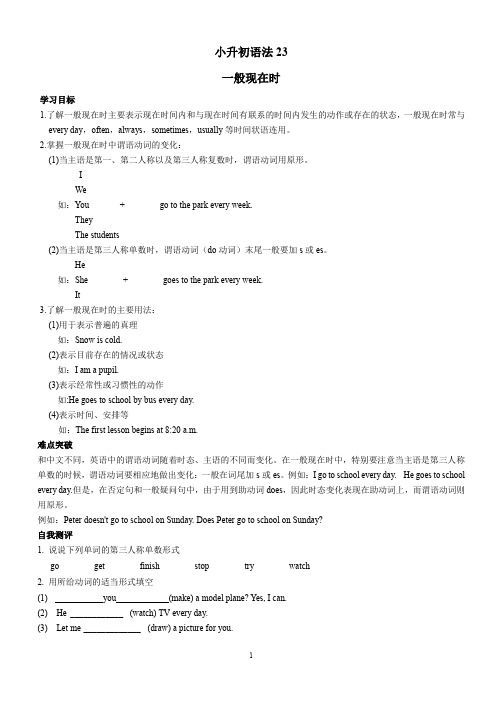
小升初语法23一般现在时学习目标1.了解一般现在时主要表示现在时间内和与现在时间有联系的时间内发生的动作或存在的状态,一般现在时常与every day,often,always,sometimes,usually等时间状语连用。
2.掌握一般现在时中谓语动词的变化:(1)当主语是第一、第二人称以及第三人称复数时,谓语动词用原形。
IWe如:You + go to the park every week.TheyThe students(2)当主语是第三人称单数时,谓语动词(do动词)末尾一般要加s或es。
He如:She + goes to the park every week.It3.了解一般现在时的主要用法:(1)用于表示普遍的真理如:Snow is cold.(2)表示目前存在的情况或状态如:I am a pupil.(3)表示经常性或习惯性的动作如:He goes to school by bus every day.(4)表示时间、安排等如:The first lesson begins at 8:20 a.m.难点突破和中文不同,英语中的谓语动词随着时态、主语的不同而变化。
在一般现在时中,特别要注意当主语是第三人称单数的时候,谓语动词要相应地做出变化:一般在词尾加s或es。
例如:I go to school every day. He goes to school every day.但是,在否定句和一般疑问句中,由于用到助动词does,因此时态变化表现在助动词上,而谓语动词则用原形。
例如:Peter doesn't go to school on Sunday. Does Peter go to school on Sunday?自我测评1. 说说下列单词的第三人称单数形式go get finish stop try watch2. 用所给动词的适当形式填空(1) you (make) a model plane? Yes, I can.(2) He ____________ (watch) TV every day.(3) Let me _____________ (draw) a picture for you.(4) How _____________ your mother____________ (go) to work every day?(5) They like _____________ (listen) to the music.(6) I (be) a boy of Grade Four.3. 选择填空( ) (1) He eats his breakfast 7:00 in the morning.A. onB. inC. at( ) (2) How many bananas in the bag?A. is thereB. are thereC. they are( ) (3) What ________ you want?A. doB. haveC. does( ) (4) These shirts are so nice but ________ quite cheap.A. theyB. it isC. they are( ) (5) Does Mike _________ ice-cream?A. likeB. likesC. liking( ) (6) What _________ Linda got?A. hasB. haveC. does( ) (7) Danny wants a new pen. He __________like his old one.A. doesn'tB. isC. do( ) (8) Can I have some milk, please? Here you __________ .A. isB. areC. some( ) (9) It's not hot now. Please the door.A. closeB. nodC. open( ) (10) What _________ your mother need?A. doB. doesC. has4. 听短文,填入所缺的词Jimmy and I twins. Every day we school on foot. We study in the same school, we in the same class. We lunch at school. We go home at 5 o' clock.(1) What's my friend's name?(2)What time does Meg get up?(3)What does Meg eat for breakfast?(4)Does Meg go to school at seven o'clock?(5)What does Meg do at nine o'clock every evening?趣味阅读A StoryOne morning, the hare and the tortoise have a race. At first the hare runs very fast. He is far ahead of the tortoise. He sits under a tree and soon he falls asleep. The tortoise keeps on running hard. At last the tortoise wins the race. He says to the hare: "Mr. Hare, you can run faster than me. But I got here first." The hare's face turns red.根据短文内容回答问题1. Who is having a race?2. Does the hare run fast at first?3. At last who wins the race?_______________________________________________________________________________________4. Why can the tortoise win the race?5. How does the hare feel?Keys:1. 略。
小升初语法复习-一般现在时(讲义)人教PEP版英语六年级下册
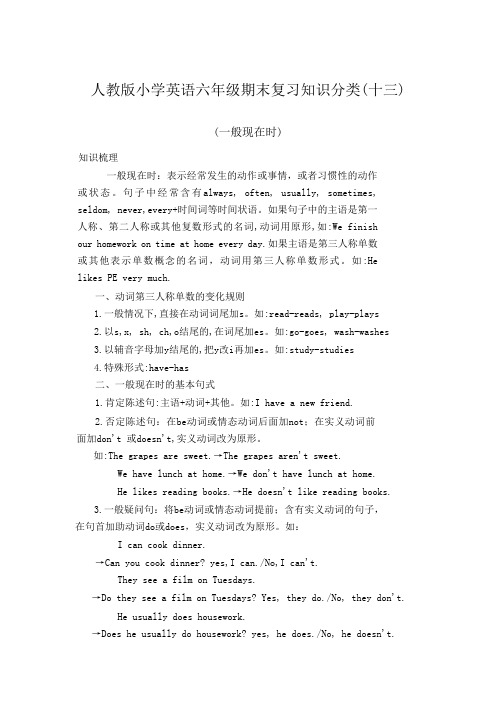
人教版小学英语六年级期末复习知识分类(十三)(一般现在时)知识梳理一般现在时:表示经常发生的动作或事情,或者习惯性的动作或状态。
句子中经常含有always, often, usually, sometimes, seldom, never,every+时间词等时间状语。
如果句子中的主语是第一人称、第二人称或其他复数形式的名词,动词用原形,如:We finishour homework on time at home every day.如果主语是第三人称单数或其他表示单数概念的名词,动词用第三人称单数形式。
如:Helikes PE very much.一、动词第三人称单数的变化规则1.一般情况下,直接在动词词尾加s。
如:read-reads, play-plays2.以s,x, sh, ch,o结尾的,在词尾加es。
如:go-goes, wash-washes3.以辅音字母加y结尾的,把y改i再加es。
如:study-studies4.特殊形式:have-has二、一般现在时的基本句式1.肯定陈述句:主语+动词+其他。
如:I have a new friend.2.否定陈述句:在be动词或情态动词后面加not;在实义动词前面加don't 或doesn't,实义动词改为原形。
如:The grapes are sweet.→The grapes aren't sweet.We have lunch at home.→We don't have lunch at home.He likes reading books.→He doesn't like reading books.3.一般疑问句:将be动词或情态动词提前;含有实义动词的句子,在句首加助动词do或does,实义动词改为原形。
如:I can cook dinner.→Can you cook dinner? yes,I can./No,I can't.They see a film on Tuesdays.→Do they see a film on Tuesdays? Yes, they do./No, they don't.He usually does housework.→Does he usuall y do housework? yes, he does./No, he doesn't.4.特殊疑问句:特殊疑问词+一般疑问句?如:He likes reading books.→What does he like?The children are from China.→Where are the children from?练习检测一、写出下列动词的第三人称单数形式。
2024小升初英语练习专题11 时态一(一般现在时) (学生版+解析版)

专题11 时态一(一般现在时)小贴士1.一般现在时的三单用法:当主语是第三人称单数时,谓语动词用第三人称的单数形式。
谓语动词的第三人称单数形式的变化规则如下:1)一般在动词后直接加s。
如:talk –talks, live –lives, stay-stays。
2)以s, x., ch, sh或o结尾的动词在其后加es。
如:watch –watches, wash –washes, go –goes。
3)以辅音字母加y结尾的动词,把y变成i再加es。
如:carry – carries, fly –flies。
4)特殊的,如:have的第三人称单数为has。
2.用法a.表示经常发生的动作、行为或存在的状态。
常用的时间状语有:often, usually, always, sometimes, seldom, never, every day/week/ year…等。
例如: I go to school every day except Sunday.除了星期日,我每天上学。
b.表示一种客观事实或普遍真理,或在谚语中。
例如: The earth moves/ goes around the sun.地球绕着太阳转。
时态(一般现在时)专练一、单项选择1.—How often ________ your father cook for you?—________.A.do, Two times B.does, NeverC.is, Once a week D.did, Seldom2.My brother usually ________ up late but tomorrow he ________ up early.A.gets; get B.get; will get C.gets; will get D.get; will gets 3.Now his father seldom ________ out for a walk after supper.A.go B.went C.goes D.gone 4.Trees _____ our city ______.A.make; clean B.makes; clean C.making; clean5.She ________ every morning.A.exercise B.exercising C.exercises D.exercised 6.My best friend ________ a Smartwatch, but I ________.A.doesn’t have; do B.doesn’t have; have C.don’t have; do D.don’t have; have 7.—My friend Lisa often ________ me with my lessons.—________ kind she is! May I become her friend, too?A.help; How B.helps; How C.help; What D.helps; What 8.—Do you have an ________ sister, Tony?—Yes, I do. And she often ________ a bike to the beach with me.A.older; ride B.older; rides C.elder, ride D.elder, rides 9.On Saturdays Susan ________ some running and goes shopping with Mary.A.is doing B.will do C.does D.go 10.—How does Lily go to school every day?—Lily ________ far from school. She goes to school by bus.A.lives B.is living C.live D.living11.My son is only 12 years old, but he is the tallest in our family. He ________ so fast.A.grows B.will grow C.grew D.has grown12.Every day I __________ sports with my parents to keep healthy.A.am doing B.do C.did D.will do13.—Where does your sister have lunch?—She usually _________ lunch at school.A.had B.has C.is having D.will have14.Because of COVID-19(新冠肺炎), my friend always ________ food and clothes online(线上).A.buying B.buys C.to buy D.buy15.Lined with trees and flowers, the streets ________ our city more attractive than before.A.would make B.was making C.make D.made16.My brother often ________ to the water park to have fun in summer.A.go B.goes C.will go D.went17.Now my father ______ his bike to work every day instead of driving.A.rides B.is riding C.rode D.will ride18.—Tina, what do you usually do at weekends?—I usually ________ swimming with my parents.A.go B.goes C.going D.went19.Mary _______ the piano very well, but she is too busy to play these days.A.is playing B.played C.plays20.It often ________ in summer. Don’t forget to take an umbrella with you.A.rain B.is raining C.rains D.will rain21.I always ________ volleyball with my classmates after school, but Gina always ________ TV at home.A.play; watchs B.plays; watchC.play; watches D.plays; watches22.Lisa always gets A in math. She ________ it well.A.don’t learn B.learns C.doesn’t learn D.learn23.Sam often ________ newspapers after supper. But today he is ________ a letter.A.reads; writing B.reads; writesC.is reading; writes D.is reading; writing24.Millions of tourists ________ the Great Wall every year.A.visit B.will visit C.visited D.have visited25.—Excuse me, what time ________ the concert ________?—Well, in fact you’re late. It ________ 20 minutes ago.A.did...begin; began B.does...begin; began C.did…begin; begins D.does...begin;begins26.His father ________ write by hand, but now he ________ computer to write.A.used to, used B.is used to, used toC.is used for, used to D.used to, uses27.—Where is Mr. Brown?—He ________ in the park. He ________ here every Sunday afternoon.A.walks; walks B.walks; is walking C.is walking; walks28.—Can I help you, sir?—Yes. I bought this radio here yesterday, but it _______.A.works B.worked C.doesn’t work D.isn’t work29.Mr. Black usually ________ TV at night. Now he ________ a basketball game on TV.A.watches; watching B.sees; seeingC.sees; is seeing D.watches; is watching30.Our English teacher always ________ us ________ try our best to realize the dream.A.encourage; to B.encourages; to C.encourage; with D.encourages; with31.My father likes football but he ________ plays it. He only ________ football matches on TV!A.always; watch B.never; watches C.often; watched D.usually; will watch32.—________? —She is of medium height.A.What does your cousin like?B.What did your cousin like?C.What does your cousin look like?D.What was your cousin like?33.—Look! It ________ outside.—Yes. It often ________ here in summer.A.rains; raining B.is raining; rains C.is raining; rain D.rains; raining 34.The students will go to the Palace Museum if it ________ tomorrow.A.won’t rain B.isn’t raining C.doesn’t rain D.don’t rain 35.Water _______ 70% of the human body.A.is made up B.makes up C.makes up of D.make up 36.—We’ll go for a picnic if it ________ this Sunday.—Wish you a lovely weekend.A.rain B.doesn’t rain C.won’t rain D.rains 37.Lily ________ about the question at the moment, and now she ________ it.A.is thinking, is understanding B.is thinking, understandsC.thinks, understands D.thinks, is understanding38.Her father is a teacher. He ________ in a high school.A.teach B.teachs C.teaches D.teaching 39.—What does David like?—He likes ________ basketball, so he often ________ it in the afternoon.A.to play; playing B.playing; to playC.playing; plays D.plays; to play40.—Mom, dad often ________ after dinner. But now he is sleeping.—He is very tired.A.walk B.will walk C.is walking D.walks 41.—________ Jim ________ a new phone?—Yes. He likes it very much.A.Does; has B.Do; have C.Does; have D.Does; like 42.We ________ a Chinese class today. We ________ an English class now.A.aren’t having; are having B.don’t have; haveC.aren’t having; have D.don’t have; are having43.She is very rich and she ________ three houses.A.get B.have C.has D.had44.My sister ________ very well.A.sing B.sings C.singing D.to sing45.—Hurry up. Look at the timetable. The last bus ________ at 11:30 p.m.—Don’t worry. We still have 10 minutes ________.A.leave; left B.left; leaves C.leaves; left D.will leave; leaves46.The boy ________ his homework after school every day.A.do B.doing C.is doing D.does47.I have a soccer, but my friend ________.A.don’t B.does C.doesn’t D.do48.He ________ a sister, but he ________ a brother.A.has; don’t hasB.have; don’t haveC.has; doesn’t hasD.has; doesn’t have49.Susan likes tennis, but she ________ a tennis ball.A.don’t have B.aren’t have C.doesn’t D.doesn’t have50.Michael usually ________ meat and vegetables.A.eat B.eatsC.is eating D.to eat51.She usually __________ her mother in the afternoon, but this afternoon she __________ a letter.A.helps; writes B.is helping; is writing C.is helping; writes D.helps; is writing52.—Poppy, with Eddie and Hobo, ________ a movie after dinner every evening.—How interested they are in it!A.watches B.watch C.are watching D.is watching53.— _________ he ________ a white shirt?— No. He has a black one.A.Does; has B.Do; has C.Does; have D.Do; have54.Mary ________ a gift from a friend of hers, but she doesn’t want to ________ it.A.receives; accept B.accepts; receive C.receive; accepts D.accept; receives55.My mother often ________ presents ________ my grandmother.A.buy; for B.buys; for C.is buying; for D.buys; to56.Sometimes my father _________ to work ________ night.A.go; at B.goes; at C.go; in D.goes; in57.Tom usually ________ English books in the morning. But now he ________ basketball.A.reads; plays B.is reading; plays C.reads; is playing58.Kangkang enjoys ________ football very much, but Han Mei ________.A.playing; doesn’t B.play; doesn’tC.to play; didn’t D.playing; didn’t59.—Can you give me a hand, Betty?—But Andy, you ________ my help every five minutes. I ________ TV at this moment.A.need, watch B.are needing, watchC.need, am watching D.are needing, am watching60.She ________ to work by bus.A.prefer to going B.prefer going C.prefers to go D.prefers go61.—What do you know about Mr. Lin?—He often ________ time ________ his children.A.takes; to help B.took; helped C.take; help D.takes; helping62.—What do you think of your Maths teacher?—He’s always strict _______ us and he never _______.A.with, smile B.about, smiles C.about, laugh D.with, smiles63.Jack often ________ two hours a day ________ TV.A.spends; watching B.spent; watches C.spends; watches D.spent; watching 64.Mike and David _______ their beds by themselves.A.doesn’t make B.makesC.don’t make D.can makes65.My sister usually ________ online on weekends.A.go B.goesC.will go D.is going66.Bill can’t play games if he ________ his homework.A.doesn’t B.don’t C.doesn’t finish D.don’t finish 67.My mother always ________ me a nice present on my birthday.A.gives B.gave C.give D.is giving 68.—________ does he ________ English class?—He has English every day.A.What time; hasB.When; hasC.What time; haveD.When; have69.We ________ at home if it ________ tomorrow.A.stay; rains B.will stay; rainsC.will stay; will rain D.stay; will rain70.Three years ago, I ________ in a primary school and now I ________ in a middle school.A.was; was B.am; am C.was; am D.am; was 71.My mum always ______ me to stick to my dream when I want to give up.A.encourage B.encouraged C.encourages D.will encourage 72.—What do you think of your English teacher?—She’s kind and friendly. She ________ on well with everyone in our class.A.gets B.got C.will get D.was getting 73.Sam ________ playing the guitar but his brother doesn’t.A.has loved B.will love C.loved D.loves 74.The beautiful girl ________ long hair.A.has B.have C.is D.are 75.Andy with Millie ________ to school every weekday.A.walks B.walking C.walk76.—________ your sister have a computer?—I don’t think she has _________.A.Do; it B.Does; one C.Do; one D.Does; it 77.Millie, ________ her mother, ________ singing.A.like; likes B.likes; likes C.like; like D.likes; like 78.He ________ at 6:30 a.m. on weekdays, but he never ________ at weekends.A.do morning exercise; do exercises B.does morning exercises; do exercises C.does morning exercises; does exercise D.does morning exercises; does exercises 79.Jim ________ “I can ________ Chinese now.”A.say, speak B.says, speak C.speaks, say D.speak, speak 80.Tom isn’t ________ his mother, but he ________ her very much.A.likes; like B.like; likes C.likes; likes D.like; like 81.The boy with his friends often ________ a kite on Sundays in spring.A.fly B.flying C.flies D.to fly82.I ________ a toy car ________ my friend.A.want to buy; for B.wants to buy; toC.want buy; for D.wants buy; for83.Uncle Joe ________ ________.A.looks; young B.look; young C.looking; young D.looks; younger 84.My mother is a good ________, and she always ________ delicious food for us.A.cooker; cooks B.cook; cooks C.cook; cooker D.cooker; cooker 85.His mother often ________ at 6:30 in the morning.A.wakes up him B.wake up himC.wakes him up D.wake him up86.I don’t know if (是否) it ________ tomorrow, but if (如果) it ________, I’ll stay at home.A.will rain; rains B.will rain; will rain C.rain; will rain D.rains; rains 87.Every winter many tourists ________ Hainan.A.visits B.visit C.will visit D.visited 88.The earth is a planet and it ________ around the sun.A.turns B.turned C.has turned D.will turn 89.My uncle usually ________ tea after dinner, but now he ________ coffee.A.drinks; drinks B.drinks; is drinking C.is drinking; is drinking90.—Jim ________ computer games now, right?—Yes. He ________ computer games for half an hour every day.A.is playing; plays B.plays; is playing C.is playing; is playing D.plays; plays 91.If Emily ________ back early, we’ll go to see the film together.A.came B.will come C.comes D.is coming92.Mary ________ her grandparents.A.live in B.live with C.lives with D.live at93.The old man sometimes ________ to the park ________ foot.A.go; on B.goes; on C.go; by D.goes; by94.John usually ________ TV after dinner for a short time. But now he ________ computer games.A.watch; plays B.watch; is playing C.watches; is playing D.watches; playing95.Every museum ________ a lot of history.A.has B.have C.having D.had96.It ________ me 3 hours to learn English every day.A.takes B.taking C.taken D.took97.There ________ a lot of housework every day. I feel very tired.A.is B.are C.was D.were98.Although Maths is difficult to learn, students never ______.A.give them up B.gave it upC.give it up D.give up them99.Many parents are busy working and always ________ their children ________.A.leave; alone B.left; alone C.leave; lonely D.left; lonely100.—Is your home near your school, Jack?—No, my home ________ in the east of our city, ________ my school is in the west.A.lie; but B.lies; but C.lays; so D.lay; and专题11 时态一(一般现在时)小贴士1.一般现在时的三单用法:当主语是第三人称单数时,谓语动词用第三人称的单数形式。
专题08 一般现在时_备战2021年小升初英语必考语法和题型(解析版)
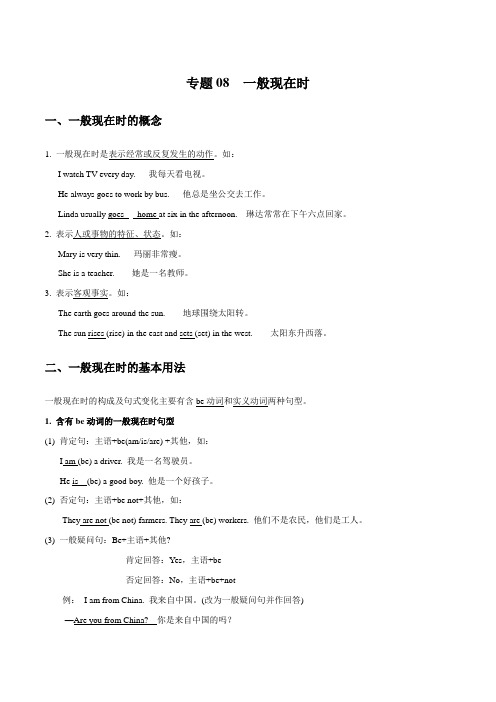
专题08 一般现在时一、一般现在时的概念1. 一般现在时是表示经常或反复发生的动作。
如:I watch TV every day. 我每天看电视。
He always goes to work by bus. 他总是坐公交去工作。
Linda usually goes home at six in the afternoon. 琳达常常在下午六点回家。
2. 表示人或事物的特征、状态。
如:Mary is very thin. 玛丽非常瘦。
She is a teacher. 她是一名教师。
3. 表示客观事实。
如:The earth goes around the sun. 地球围绕太阳转。
The sun rises (rise) in the east and sets (set) in the west. 太阳东升西落。
二、一般现在时的基本用法一般现在时的构成及句式变化主要有含be动词和实义动词两种句型。
1. 含有be动词的一般现在时句型(1) 肯定句:主语+be(am/is/are) +其他,如:I am (be) a driver. 我是一名驾驶员。
He is (be) a good boy. 他是一个好孩子。
(2) 否定句:主语+be not+其他,如:They are not (be not) farmers. They are (be) workers. 他们不是农民,他们是工人。
(3) 一般疑问句:Be+主语+其他?肯定回答:Yes,主语+be否定回答:No,主语+be+not例:I am from China. 我来自中国。
(改为一般疑问句并作回答)—Are you from China? 你是来自中国的吗?—Yes, I am. 是的,我是来自中国。
—No, I am not. 不是,我不是来自中国。
2. 含有实义动词的一般现在时句型。
(1) 肯定句:主语+动词原形+其他。
(主语为非第三人称单数时用)主语+动词三单+其他。
小升初语法一般现在时态

小升初语法一般现在时态一、一般现在时的定义一般现在时表示现在经常反复发生的动作,存在的状态或习惯性的动作的时态。
二、一般现在时的结构一般现在时用行为动词的原形,但第三人称单数作主语时,动词的词尾要加-s或-es。
现在以连系动词be和行为动词read为例,对一般现在时的肯定句、否定句、疑问句及其简略答语的构成连系动词be的各种形式常与代词或not缩写成一个词。
助动词do,does一般只有与not缩写。
联动词donot的缩写形式为don’t,doesnot的缩写形式为doesn’t。
二、动词加-s或-es(动词第三人称单数)当主语是第三人称单数时,谓语动词需加-s或-es1.一般在词尾加–s例:work—worksleave---leavesswim---swims2.以字母s,x,ch,sh或o结尾的词加-es例:pass---passesfix---fixesteach---teachesdo---does3.以辅音字母加y结尾的词,先变y为i再加-es例:study---studiescarry---carriesfly---fliescry---cries三、一般现在时的用法1.表示经常或习惯性的动作。
常与often(经常),always(总是),sometimes(有时),everyday (每天),onSundays/Mondays等表示频度的时间状语连用。
一般现在时的时间状语有:today,often,sometimes,always,usually,everyday(week,month,year,…),thisyear,onceaweek(month, year,…)一周(月,年)一次例句:Igetupat6o’clockeveryday.Heoftengoestoschoolbybike.2.表示客观事实,普遍真理。
例句:Twoandtwoisfour.二加二等于四。
Theearthmovesaroundthesun.地球绕着太阳转。
小升初语法专题讲练第18讲:一般现在时

小升初语法第18讲:一般现在时知识点讲解与考题精练(有答案)【考点解读】英语中,人们在句子表达的过程中,随着时间的变化,谓语动词的形式会发生相应的变化,称之为时态。
动词时态共有十六种,小升初常考的时态有四种:一般现在时;一般将来时;一般过去时;现在进行时。
小升初考试中要求掌握四种时态的概念、动词变化规则、标志词、句型变化等,重点民办学校在分班考中都会涉及四种时态的用法。
【知识讲解1】小学阶段时态汇总【知识讲解2】一般现在时1.现阶段存在的状态;现在时刻内经常性、习惯性的动作。
2.用法(1)经常性或习惯性的动作。
例如:It seldom snows in Suqian now.(2)现在的情况或状态。
例如:He loves sports.(3)表示现在的能力、特征、职业等。
如:I am a teacher.(4)表示客观真理、科学事实、格言以及不受时间限制的客观存在。
如:Light travels faster than sound.(5)在if, when, as soon as, until, after, before等连接词引导的时间或条件状语从句中,从句中谓语动词要用一般现在时,主句要用将来时。
例如:Turn off the light before you leave.We will start as soon as you are ready.(6)表示按规定、计划、安排或时间表将要发生的情况,如用于火车、飞机等定期定点运行的交通方式中,表示按时刻表安排将要发生的动作或状态,涉及到一些动词,如:begin, start, stop, arrive, come, go, leave, return, open, close, be等代替将来时。
如:My plane leaves at 11 a.m. tomorrow.3.标志词★频度副词:often, usually, always, sometimes, never, seldom,once a week, twice a year,★时间词组:every week/day/year/month...on Sundays,in January,in the morning等。
- 1、下载文档前请自行甄别文档内容的完整性,平台不提供额外的编辑、内容补充、找答案等附加服务。
- 2、"仅部分预览"的文档,不可在线预览部分如存在完整性等问题,可反馈申请退款(可完整预览的文档不适用该条件!)。
- 3、如文档侵犯您的权益,请联系客服反馈,我们会尽快为您处理(人工客服工作时间:9:00-18:30)。
小升初语法一般现在时态一、一般现在时的定义一般现在时表示现在经常反复发生的动作,存在的状态或习惯性的动作的时态。
二、一般现在时的结构一般现在时用行为动词的原形,但第三人称单数作主语时,动词的词尾要加-s 或- es。
现在以连系动词be和行为动词read为例,对一般现在时的肯定句、连系动词be 的各种形式常与代词或not缩写成一个词。
助动词do,does 一般只有与not 缩写。
联系动词be缩写形式如下动词do not 的缩写形式为don’t,does not 的缩写形式为doesn’t。
二、动词加-s 或-es (动词第三人称单数)当主语是第三人称单数时,谓语动词需加-s 或-es1.一般在词尾加–s例:work—works leave --- leaves swim --- swims2.以字母s,x,ch,sh 或o结尾的词加-es例:pass--- passes fix ---fixes teach --- teaches do--- does 3.以辅音字母加y结尾的词,先变y为i再加-es例:study --- studies carry --- carries fly --- flies cry --- cries三、一般现在时的用法1.表示经常或习惯性的动作。
常与often(经常), always(总是), sometimes (有时), every day(每天), on Sundays/Mondays 等表示频度的时间状语连用。
一般现在时的时间状语有:today, often, sometimes, always, usually, every day ( week, month, year,…) , this year, once a week ( month, year,…) 一周(月,年)一次例句:I get up at 6 o’clock every day.He often goes to school by bike.2.表示客观事实,普遍真理。
例句:Two and two is four.二加二等于四。
The earth moves around the sun.地球绕着太阳转。
一般现在时态专项练习一、写出下列动词的第三人称单数形式post eat stop jump go likevisitpassrisereadridehavegivewriteswimstudywatchflyteachdo二、单项选择( ) you have a book ?A Do B. Are C. Is D. Have( ) Li Lei like to watch TV?______________.A. Yes, he like.B. No, he doesn’t.C. Yes, he’d like.D. No, he likes.( ) doesn’t ______ her homework in the afternoon.A. doingB. to doC. doesD. do( ) ____ Mr. Smith ______ to England?A. do, goB. is , goC. does, goD. does , goes( )5. _____ she ______ home at six every day?A. Is , leaveB. Does , leaveC. Is , leavesD. Does , left三、用下列动词的适当形式填空______ ( get ) up at 6 o’clock every day.father ______ (have) a lovely dog.______ (go ) to school on foot.______ (do ) not like watching TV.______ (play) football every Sunday afternoon.四、按要求完成下列各题is Saturday.(变成一般疑问句)_________ ________ Saturday ?he play basketball every weekend? (肯定回答)Yes, ______ _______.looks like her sister.(变一般疑问句)_____ she ______ like her sister ?and Sam look the same.(一般疑问句)______ they _____ the same ?they always go to the movie (电影院) on Sundays ? (否定回答)No, _______ _______.五、英汉互译1.Tom经常放学后(after school)踢足球。
__________________________________2.我喜欢唱歌。
__________________________________3.He often goes to school on foot.__________________________________4.Children like to play this game.__________________________________5.今天是星期日。
__________________________________能力测试卷(一般现在时)一、写出下列动词的第三人称单数形式go have swim study rise stopdoridecrygowriteflyplayreadcomebuygivewatchworkcarry二、用动词的适当形式填空1.He _______ (go) to school on foot.2.She _______ not like watching TV. (do)3.My father _______ (have) a lovely dog.4.I often ______ ( get ) up at six every morning.5.My mother _______ ( work) in a school.三、英汉互译1.他经常在周六的时候读英语。
_____________________________2.Peter 每天都帮助妈妈做家务。
______________________________3.Tom always plays football after4.I get up at six o’clock every5. The coat fits (适合) me very小升初语法现在进行时态一、现在进行时的定义现在进行时是表示在现在某一时刻或某段时间正在进行的动作的时态。
二、现在进行时的构成现在进行时由“系动词(am,is ,are)+ 现在分词(动词加-ing形式)”构成。
现在以动词work为例,对现在进行时的肯定句、否定句、疑问句及三、现在分词的构成1.一般在动词原形末尾加-ing。
stay --- staying do --- doing listen --- listening2.以不发音的字母e 结尾的动词,先去掉e,再加-ing。
make --- making ride --- riding give --- giving3.以一个辅音字母结尾的重读闭音节词,先双写这个辅音字母,再加-ing。
put --- putting sit --- sitting run --- running4.以ie 为重读音节结尾的单词,先去掉e,把i 变为y,再加–ing。
lie --- lying die --- dying四、现在进行时的用法1.表示现在或说话时正在进行的动作,常和下列时间状语连用:now, at thismoment, at present, these days (years), this term … 有时也与look , listen 等连用。
例句:Look, what are the monkeys eating?看,那些猴子在吃什么?2.表示当前一直或反复在进行的动作或难以终止的动作。
例句:They are running and jumping all the time.他们一直在跑啊跳啊。
现在进行时态专项练习一、写出下列动词的现在分词形式stay __________ do __________ listen __________ suffer __________ refuse __________ close __________ operate _________ die _________ work ________spend _________look _________make __________put __________sit __________run __________tie __________take _________give _________ride _________please _________win _________begin _________open _________lie _________二、用所给动词的适当形式填空1.Mary and Lucy are ________ (dance) now.2.Listen! Someone is _______ (play) the piano in the next room.3.He is __________ (sweep) the floor at the moment.4.Look ! The cat ________ ________ (eat) the fish on the table.5.A: ______ you _______ (study) French ?B: Yes , I am.6.She often ____________ (dance) after school.7.My father and mother ______ ______ (swim) in the pond.8.My sister is ________ (fly) a kite in the garden.9.We are __________ (watch) TV now.10.Be quiet ! The baby _____ ______ (sleep) now.三、改错1.We are cleanning our classroom. ______________________________2.She is sing in the next room. ______________________________3.What am you doing? ______________________________4.Mary is comeing back from5.He often flying kites on Sundays. ______________________________6.They is reading books now. ______________________________7.My brother is plays the guitar now. _______________________________8.Sally is danceing in the room. _______________________________9.I watching TV at home now. ________________________________10.Do you listening the radio now? ________________________________四、英汉互译1.他正在教室里做作业。
